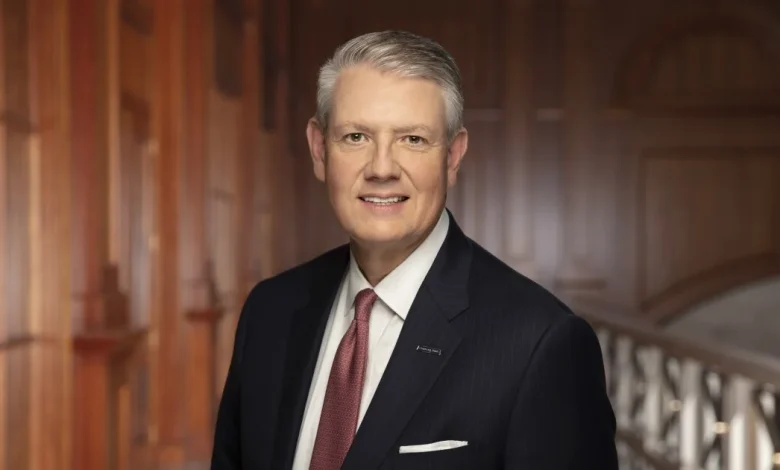Another bank tried to buy Comerica before Fifth Third deal

- Key insight: An unnamed bank tried to buy Comerica in September, weeks before the bank’s board decided that Fifth Third would be the ideal acquirer, according to a new regulatory filing.
- What’s at stake: At nearly $11 billion, the Fifth Third-Comerica deal is the largest of 2025.
- Forward look: Comerica CEO Curtis Farmer will receive $8.75 million per year as Fifth Third’s vice chair, after which he will maintain the same compensation in his role as senior advisor.
UPDATE: This article includes additional information from the Wednesday regulatory filing and the two bank’s most recent proxy filings.
Once Comerica decided to sell itself to another bank, the Dallas company set its sights on Fifth Third Bancorp as a buyer.
Another bank pitched a deal to Comerica in September, but the $77 billion-asset company’s board decided that Fifth Third would be “the optimal merger counterparty,” according to a public document filed Wednesday night. The two banks eventually hatched a deal worth nearly $11 billion, the largest bank acquisition announcement so far this year.
The megamerger started with a phone call. Comerica CEO Curt Farmer told Fifth Third CEO Tim Spence on Sept. 18 that his bank was looking to sell, and wondered if Cincinnati-based Fifth Third would consider a deal.
Spence was in Dallas the next day.
That mid-September phone call came just over a week after the two chief executives’ previous phone conversation. Farmer had rung Spence to congratulate him on taking over a contract from Comerica, making Fifth Third the financial agent for a U.S. government prepaid debit card program.
The banks worked out negotiations over the next two-and-a-half weeks, executing the agreement on Oct. 5, and announcing the deal the following day.
“I had actually called [Spence] to congratulate him, and literally did not know that I’d be talking to him, you know, in the week or so after that, about the possibility of an acquisition,” Farmer told American Banker in an interview when the deal was announced. “We certainly were thinking about a potential acquisition partner or merger partner, but had not reached that conclusion.”
The two companies expect the deal, which is subject to regulatory approval and a competitive review by the U.S. Department of Justice’s antitrust division, to close in the first quarter of next year.
When the companies combine, Fifth Third will gain a foothold in high-growth markets like Texas where it had been targeting expansion. Comerica, which had been facing calls from activist investors to sell itself, will land a solution to its funding pressures and balance sheet pain.
Deals between banks have taken off in 2025, after years of relatively tepid acquisition activity. The merger-friendly regulatory environment and more economic certainty this year has prompted financial institutions to consolidate at a rapid clip.
Extras for executives
The Wednesday night disclosure also included new information about the future of Farmer, who has been Comerica’s CEO since the start of 2020.
Farmer will become Fifth Third’s vice chair, reporting to Spence, and will earn annual compensation of $8.75 million in that role. He will also receive deferred compensation of $10.63 million, to be paid in a lump sum following his termination of employment with the bank, as part of the change-in-control benefits he would have received.
In addition, Fifth Third will pay Farmer $10 million in cash, half of which is to be paid immediately, and the other half of which is due in one year, according to the Wednesday disclosure.
After serving as vice chair for an undisclosed period of time, Farmer will serve as a senior advisor to Fifth Third, and will receive annual compensation of $8.75 million, plus an executive office, administrative support and travel and expense benefits.
At Comerica, Farmer received total compensation of $8.86 million in 2024, according to the bank’s latest proxy filing.
Spence’s total compensation in 2024 as Fifth Third’s CEO was $10.1 million. The next-highest paid executive at the Midwest bank was Chief Financial Officer Jamie Leonard, who’s been at the bank since 1999, and earned $6.3 million last year.
After joining Fifth Third, Farmer will have the use of corporate or company-paid aircraft for personal purposes with a value up to $200,000 per year. At Comerica, Farmer has been able to spend up to $150,000 per year on private air travel. In 2024, his aircraft costs totaled $139,000, based on “actual flight hours, crew expenses, catering fees, landing fees and fuel surcharge,” according to Comerica’s latest proxy statement.
Farmer’s 2024 compensation package at Comerica also included $28,000 that was used for security services and personnel during personal travel, financial planning, disability insurance coverage and “items received for employee events.”
Although Farmer already has a compensation and employment agreement with Comerica, Fifth Third will pay him $42 million if he loses his position in the next roughly two years. At his current compensation level, he will earn that amount in about five years. Farmer will also be eligible to sit on Fifth Third’s board until a decade from now, around the time that he reaches the age of 72.
Fifth Third and Comerica noted in Wednesday’s filing that certain executives and directors “may have interests in the mergers that are different from, or in addition to,” the interests of shareholders that may create potential conflicts of interest.
Comerica has change-in-control agreements with certain executives that offer so-called golden parachutes if those employees lose their jobs within 30 months of an acquisition without cause.
Fifth Third said it currently doesn’t have compensation agreements with any Comerica executives besides Farmer, but it has agreed to the continued employment of Peter Sefzik, Comerica’s chief banking officer, as its head of wealth and asset management.
Other executives who may be entitled to change-in-control payments include Comerica Chief Financial Officer James Herzog, for $12 million, and Chief Operating Officer Megan Crespi, for $8.4 million.





